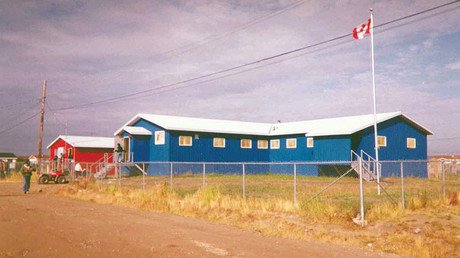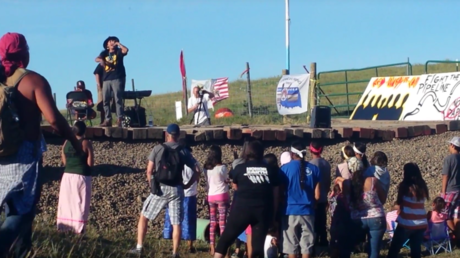‘No justice for indigenous people’: Uproar in Canada after acquittal in Aboriginal killing
The decision to acquit a white farmer of killing an indigenous man has revealed problems that stretch far beyond the particular case and exposes holes in Canada’s justice system, community representatives told RT.
Frustration and anger have been simmering within the Canadian indigenous community after a Saskatchewan jury last week delivered a not-guilty verdict for Gerald Stanley in relation to the fatal shooting of a 22-year-old Red Pheasant First Nation resident.
In August 2016, Colten Boushie and four of his friends drove onto Stanley’s farm to seek help after getting a flat tyre. However, it turned into an altercation, as the farmer believed the group was trying to steal his vehicle. Stanley fired several warning shots, with one hitting Boushie in the back of the head. Stanley claimed he didn’t intend to shoot anyone and that his handgun went off by accident.
Hundreds rally outside Court of Queen's Bench in #yqr calling for justice in support of #ColtonBoushie and to protest the not guilty verdict in #stanleytrial#Boushiepic.twitter.com/0GnYLjXAG1
— Katelyn Wilson (@GlobalWilsonK) February 10, 2018
“Everybody has reason to be upset with the verdict,” John Lagimodiere, publisher and editor of Aboriginal newspaper ‘Eagle Feather News,’ said in an interview with RT.
The case raised concerns among the public that “it is very hard to find justice for indigenous people in Canada.” He also noted police had been “crass and cruel” with the victim’s family, raiding their home in search for evidence right after they were informed about the incident.
A wave of protests and vigils swept across the country following the acquittal, with demonstrators seeking to draw attention not only to the Boushie ruling, but to the entire legal system that is said to be failing to provide justice for the First Nations people.
Chief of the Federation of Sovereign Indigenous Nations Bobby Cameron said this was “nothing new,” however. “[The verdict] highlighted and exposed the ugliness of justice system in Canada,” he said.
Calgary Rally and March for Colton Boushie...collage 1#justiceforcolten#indigenouslivesmatter#murderismurder#idlenomore#YYC@autumnes_leavespic.twitter.com/uFeZmv6iRz
— Deborah Green (@DeborahGreenCCC) February 12, 2018
Colten Boushie's mom Debbie Baptiste stands in the middle of supporters. Rally held to demand #justiceforcolten following not guilty verdict in Gerald Stanley's trial and to call for better Indigenous representation in Canada's justice system #boushie#coltenboushie#stanleytrialpic.twitter.com/TCsDP7OZ15
— Olivia Stefanovich (@CBCOlivia) February 10, 2018
“From start to finish, it showed there was no justice available,” Lagimodiere said. The jury clearing Stanley of all charges “left a lot of people wanting more,” he continued.
“There’s a lot of pain in the community and a lot of sorrow and it’s fomenting into anger and rage.”
“We’re [the indigenous] overrepresented in jails, we’re underrepresented in the system, so it doesn’t seem we get a fair shake from a jury of our peers,” he said, pointing to the fact that the jury in the Boushie case was “apparently non-indigenous.”
Just spoke with @Puglaas. I can't imagine the grief and sorrow the Boushie family is feeling tonight. Sending love to them from the US.
— Justin Trudeau (@JustinTrudeau) February 10, 2018
While it’s very hard to get indigenous people on juries, especially in racially charged cases, the defense, Lagimodiere said, exercised the right of peremptory challenge – a tool that allows them to reject candidates without any explanation.
Sympathies poured in from top officials, including Prime Minister Justin Trudeau and his indigenous Justice Minister Jody Wilson-Raybould, who agreed that a lot should be done to fix the judicial system. “We understand that there are systemic issues in our criminal justice system that we must address,” the prime minister admitted.














